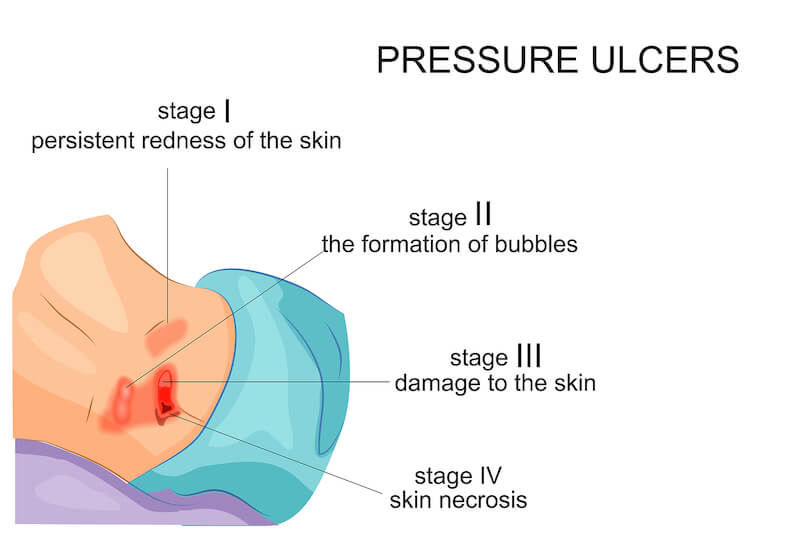What are the Stages of Bedsores and Neglect in New Jersey?
Services
Bedsore Stages: Identification and Treatment in New Jersey Nursing Homes
If a loved one or family member has been diagnosed with bedsores, you should know some basic facts about the various stages of these serious medical conditions. Especially in the assisted living and nursing home environments, bedsores can often be a sign that patients are not being cared for properly. Understanding the types of bedsores and the stages of severity can assist you and your family in pursuing claims of negligence against staff members and the administration of nursing home facilities.

How Bedsores Form
Bedsores are caused by prolonged pressure or friction that causes damage to skin and other tissues. They usually develop on elbows, knees or other areas of the body that lack sufficient padding between skin and bones. Patients usually develop bedsores after being left in one position for too long or after being moved too roughly by nursing home staff members.
Bedsores are categorized by their severity from Stage 1 through Stage 4. While Stage 1 of bedsore development is relatively mild, Stage 4 bedsores are the most serious and dangerous to the health of older people. At the first sign of bedsores at any stage, however, it is usually a good idea to contact a New Jersey bedsore lawyer to ensure fair compensation for the neglect your loved one has experienced in the nursing home environment.
Stage 1 Bedsores
Stage 1 bedsores are the mildest form of these injuries. They involve discoloration of the skin and, in some cases, pain. The temperature of the affected area may also be warmer than the surrounding skin. Stage 1 bedsores can often be treated effectively by keeping pressure off the area and keeping the skin clean and dry during the healing process.
Stage 2 Bedsores
If left untreated or unnoticed, Stage 1 bedsores can quickly develop into Stage 2 of these conditions. During Stage 2, bedsores can break open to reveal tissue beneath, which usually causes severe pain for patients. Stage 2 bedsores look and sometimes act like blisters and can ooze fluid if broken. Treatments for Stage 2 bedsores include soaking in saline solution and removal of dead tissue to encourage healing and recovery.
Stage 3 Bedsores
If bedsores are not detected or treated during Stage 1 or Stage 2, Stage 3 bedsores can cause serious and permanent damage to tissues and skin. Stage 3 bedsores are very difficult to treat, especially if pressure cannot be removed completely from the area of the bedsore for a few months. In general, Stage 3 bedsores are treated in much the same way as Stage 2 bedsores. The healing process, however, will usually take much longer. Measures may also be taken to combat potential infection of the area. Sepsis and damage to nerve endings can also occur as a result of Stage 3 or Stage 4 bedsores.
Stage 4 Bedsores
Stage 4 bedsores are the most severe type of bedsores and can cause damage to tendons, nerves and surrounding tissues. During Stage 4, some patients may not feel any pain in the area because of the damage to nerve endings that bedsores can cause. These deep and damaging bedsores can also cause serious infections that can even affect the bones of the patient.
Deep Tissue Injuries
The exact stage of the bedsore may not be obvious, especially if the sore has not yet opened. These types of bedsores are called deep tissue injuries. While they pose a lower risk of infection because the skin is not broken, they can be quite difficult to treat effectively.
Why Working with a New Jersey Nursing Home Lawyer Makes Sense
If your family member has been injured and has developed bedsores at any stage while in the care of a nursing facility, you will need the assistance of a New Jersey nursing home lawyer to help you pursue your claims against the nursing home both in and out of court. Your attorney will work with you to gather the evidence necessary to hold the responsible parties financially responsible for your loved one’s injuries and pain. This can provide valuable resources for your family member and can improve the standard of treatment for all other patients at the facility in the future.
At the Di Lauri & Hewitt Law Group, we can assist you with New Jersey nursing home cases to help you and your loved ones to achieve a sense of closure and to hold negligent personnel and facilities accountable for their actions. Give us a call today at 973-354-5783 to schedule a consultation with our team. We are here for you.
Get in touch with us
How Can
Our Lawyers
Help You?
We understand how important it is for our clients to get the legal help they need today. We are here for you and ready to help.
Why Trust Us?
Rated by Super Lawyers
As a Rising Star personal injury attorney in Morristown, New Jersey for multiple years in a row.
No aspect of this advertisement has been approved by the Supreme Court of New Jersey.
National & Local Proficiency
We have litigated in every vicinage (court) in New Jersey and we deliver an exceptional breadth and depth of experience in representing corporations, businesses, families, and individuals in need of legal advisors to protect their rights.
20+ Years of Combined Experience
We have a track record of success that spans over two decades in getting you the results you deserve.
